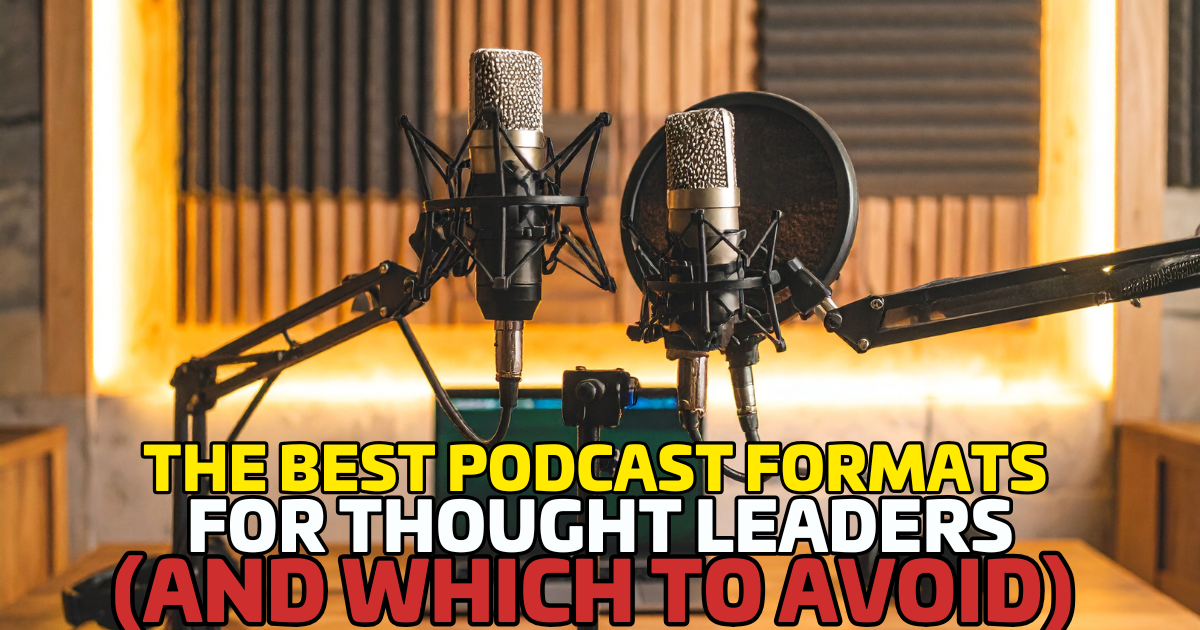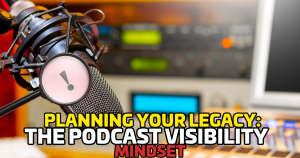Podcasts have exploded as one of the most powerful ways for thought leaders to connect with audiences.
They provide space for long-form conversations, deep storytelling, and authentic human connection that traditional PR rarely allows.
But here is the truth: not every podcast format will help you achieve your goals.
Some formats are perfect for demonstrating authority, while others limit your ability to share meaningful insights.
If you want to grow as a thought leader, you must be strategic about the podcast appearances you choose.
This guide will walk you through the best podcast formats for thought leaders and the formats to avoid so you can invest your time in opportunities that truly move the needle.
Why Podcast Format Matters for Thought Leaders
The format of a podcast dictates how much time you get, how deeply you can share your message, and how well the audience connects with you.
- A great format positions you as an expert, allows space for storytelling, and creates evergreen content that delivers ROI long after the episode airs.
- A poor format makes you sound like just another guest, restricts your message, or reduces your story to a quick soundbite.
For thought leaders, choosing the right formats can mean the difference between being remembered as an authority or forgotten as background noise.
The Best Podcast Formats for Thought Leaders
1. Long-Form Interview Podcasts
Why it works:
Long-form interviews allow you to dive deep into your expertise, personal journey, and vision for the future. Instead of surface-level talking points, you can explain complex ideas in an engaging way.
Best for: Founders, CEOs, and experts who want to establish themselves as thought leaders in their niche.
Examples: The Tim Ferriss Show, The Jordan Harbinger Show, The School of Greatness.
2. Storytelling and Narrative Podcasts
Why it works:
These shows blend conversation with storytelling, often weaving your journey into a larger narrative about business, leadership, or personal growth.
They allow you to connect emotionally with listeners who want to hear the human side of leadership.
Best for: Thought leaders who have a powerful origin story or mission-driven brand.
Examples: How I Built This, Masters of Scale.
- Niche Industry Podcasts
Why it works:
Podcasts that focus on a specific industry or vertical allow you to speak directly to your ideal audience.
Even if the audience size is smaller, the relevance and targeting are far stronger.
Best for: Leaders who want to reach decision-makers, potential partners, or customers in their specific market.
Examples: B2B Growth, SaaStr Podcast, niche health, finance, or tech shows.
4. Panel or Roundtable Podcasts
Why it works:
These formats include multiple guests and a host, which creates dynamic conversation.
Thought leaders can showcase expertise by contributing valuable insights alongside peers.
Best for: Leaders who thrive in collaborative discussions and want to demonstrate their ability to add unique value to industry conversations.
Examples: The Marketing Companion, Pivot.
- Educational or “How-To” Podcasts
Why it works:
Educational podcasts let you share frameworks, strategies, and step-by-step insights. This positions you not only as a thought leader but also as a trusted teacher or mentor.
Best for: Consultants, coaches, and subject-matter experts.
Examples: Marketing School, Online Marketing Made Easy, Smart Passive Income.
Podcast Formats Thought Leaders Should Avoid
While all podcasts have value for their audiences, not all formats serve the goals of a thought leader.
1. Super Short “Q&A” Podcasts
Why to avoid:
Episodes under 10 minutes rarely allow you to go beyond a surface-level introduction. They often feel transactional and miss the emotional connection that long-form interviews deliver.
2. Highly Promotional Podcasts
Why to avoid:
Some shows are designed mainly for guests to pitch products or services. These can damage credibility since they feel more like infomercials than meaningful conversations.
3. Comedy or Entertainment-Only Formats
Why to avoid:
Unless your brand is built on entertainment, these formats can dilute your message. Listeners may enjoy the humor but fail to take away your expertise or authority.
4. Overcrowded Panel Podcasts
Why to avoid:
While roundtables can work, shows with too many guests make it hard to stand out. Your insights can get lost in the noise, and the audience may not remember who you are.
- “One Question” Podcasts
Why to avoid:
Some shows stick to a single question or micro-interview format.
These are interesting for listeners but rarely give thought leaders enough space to establish expertise.
How to Choose the Right Podcast Format for You
If you are serious about growing your influence as a thought leader, here is how to evaluate whether a podcast format is worth your time:
- Length of episodes → Aim for at least 25–30 minutes.
- Style of content → Look for shows that emphasize storytelling, insights, and real conversation.
- Audience alignment → Make sure the show’s listeners match your ideal community.
- Host credibility → A respected host transfers authority to you as the guest.
- Evergreen value → Choose shows that produce content meant to last, not just trend for a week.
Why Choosing the Right Format Maximizes ROI
When you appear on the right podcast formats, you:
- Build authentic authority by sharing stories and insights in depth.
- Reach targeted audiences who actually care about your expertise.
- Create long-term digital assets that boost discoverability.
- Strengthen relationships with podcast hosts who influence your industry.
The wrong format can still give you exposure, but the right format amplifies trust, visibility, and credibility in ways that compound over time.
Not every podcast appearance is equal.
For thought leaders, the format determines whether you have the time, space, and audience connection needed to make a lasting impact.
Choose long-form interviews, storytelling podcasts, niche shows, and educational formats to showcase your authority.
Avoid short Q&A shows, overly promotional podcasts, or entertainment-first formats that limit your ability to share your message authentically.
The best podcast formats give you space to be yourself, tell your story, and build influence that lasts.
Ready to find the right shows for your expertise?
Check out our guide on How to Get Booked on Top Podcasts as a Founder or CEO and start shaping your podcast PR strategy today.




